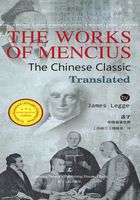
CHAPTER VII
1. Mencius, having an interview with the king Hsüan of Ch'î, said to him, 'When men speak of "an ancient kingdom", it is not meant thereby that it has lofty trees in it, but that it has ministers sprung from familieswhich have been noted in it for generations. Your Majesty has no intimate ministers even. Those whom you advanced yesterday are gone to-day, and you do not know it.'
2. The king said, 'How shall I know that they have not ability, and so avoid employing them at all?'
3. The reply was, 'The ruler of a State advances to office men of talents and virtue only as a matter of necessity. Since he will thereby cause the low to overstep the honourable, and distant to overstep his near relatives, ought he to do so but with caution?
4. 'When all those about you say,—"This is a man of talents and worth", you may not therefore believe it.


CHAPTER 7. THE CARE TO BE EMPLOYED BY A PRINCE IN THE EXPLOYMENT OF MINISTERS; AND THEIR RELATION TO HIMSELF AND THE STABILITY OF HIS KINGDOM.
1. On the idiom 之谓, see Prémare, on character 之;but the samples which he adduces are not quite similar to those in this passage. Literally, the opening sentence would be:—'That which is called an ancient kingdom,is not the saying (之谓) of saying it has lofty trees; it is the saying of—it has hereditary ministers.'The 谓 in非谓 might be omitted, and yet it adds something in the turn of the sentence. As opposed to 今日, 昔者='yesterday'. Châo Ch'î strangely mistakes the meaning of the last clause, which he makes to be:—'Those whom you advanced on the past day, do evil to-day,and you do not know to cut them off!'
2. 舍=捨, the 3rd tone, 'to let go', 'to dismiss'.
3. 如不得已,—literally, 'as a thing in which he cannot stop'.


When your great officers all say,—"This is a man of talents and virtue", neither may you for that believe it. When all the people say,—"This is a man of talents and virtue", then examine into the case, and when youfind that the man is such, employ him. When all those about you say,—"This man won't do", don't listen to them. When all your great officers say,—"This man won't do", don't listen to them. When the people all sav,—"This man won't do", then examine into the case, and when you find that the man won't do, send him away.
5. 'When all those about you say,—"This man deserves death", don't listen to them. When all your great officers say,—"This man deserves death", don't listen to them. When the people all say,"This man deserves death", then inquire into the case, and when you see that the man deserves death, put him to death.In accordance with this we have the saying, "The people killed him."
6. 'You must act in this way in order to be the parent of the people.'


Compare the Chung Yung, xx. 13.
4. 未可, 'you may not yet believe that the man is so and so'. See on Analects, XIII. xxiv.
6. Compare the Great Learning, Commentary x.3. We may see the second person in translation or, more indefinitely, the third.

